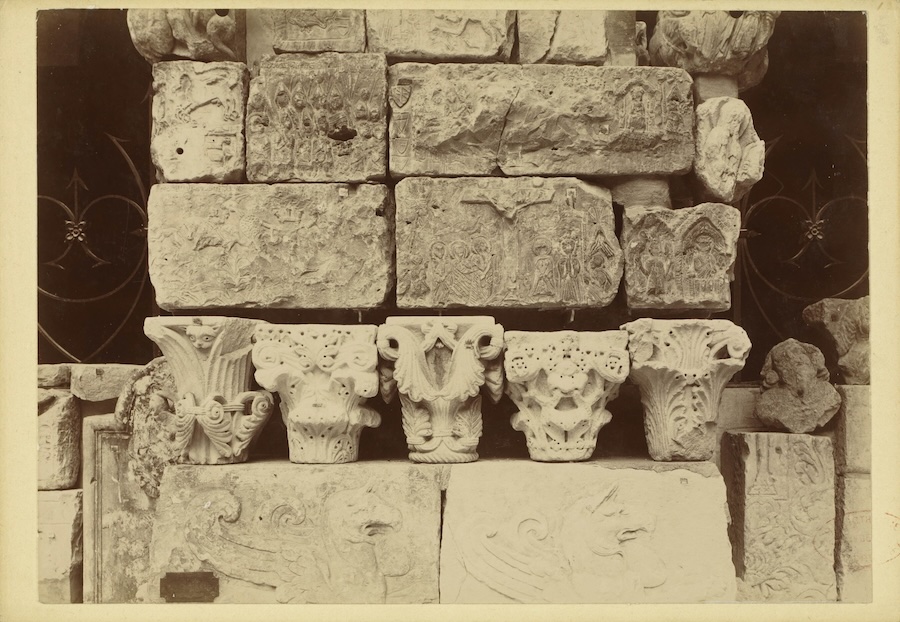Nîmes
I was standing on a corner in Nîmes admiring the Maison Carrée, thinking that the roof of the Roman temple resembled the accent—the so-called petit chapeau—over the “i” in the town’s name, when a sudden blow knocked me off my feet, and there I lay, spreadeagle (or is it spreadeagled?) on the ground, like Saint Paul in Caravaggio’s painting, with a horse’s hoof looming over his belly, “It is hard for thee to kick against the pricks,” in Santa Maria del Popolo, hearing the bicycle delivery man with his pizza in a zippered bag recite rote apologies, as though such collisions happened all the time and he had promises to keep, his orange windbreaker, which helped prevent cars from hitting him but didn’t prevent him from hitting me, flapping in the wind, while I lay there in the street going over each bone in my body to ask if it was intact and remembering the last time I was in Nîmes, with my French professor, with whom I was, as she no doubt put it to her friends, having an affair—but was it an affair if I was twenty and she was thirty?—and we went to a bullfight in the French mode (no bulls killed) rather than the Spanish (all bulls slaughtered) in the arena, where I wondered, not for the last time, what I got from the affair, although what I always say is that it worked miracles for my French, which still has gaps, like whether Maison Carrée, as I asked myself as I lay on the ground in Nîmes, means square house or squared house.
Cologne
Nothing traumatic ever happened to me in Cologne, although I once sat through the interminable second part of Faust there, courtesy of a rich cousin of my father who talked me, ticketless, into the sold-out production, where I huddled in the aisle, understanding little since my German was merely “serviceable,” so why do I have a recurrent nightmare in which I am trying desperately to get to Cologne to catch a plane home, hindered by revolving doors without egress, missing tickets (again), cars I can’t drive, departure times I can’t meet, when all my associations with the city are benign, including a first day cover of the UNESCO stamp (the star of my childhood collection) commemorating the completed Cologne Cathedral and symbolizing the resurgence of Europe, despite the surrounding rubble and the 20,000 dead in the city of Cologne alone, killed by RAF carpet bombers, as though in response to Coleridge’s curse on the place, which I once heard James Wright—whose translations of Trakl I so loved—recite, with its litany of “two and seventy stenches/all well defined, and several stinks,” an ironic description for a city best known for its Eau de Cologne, once known as “plague water,” and specifically formulated to ward off the Black Death, as if Cologne (as in my dreams, I now realize) is only a way station to the destination that awaits us all, much as, although we couldn’t know it, death was stalking James Wright, that wonderful poet, that very afternoon as he cursed the city of Cologne, and was soon to claim him, just a few weeks later, with cancer of the tongue, a horrible fate for anyone but especially for a poet?
Leenane
I was met with blank stares at the Wool Centre when I inquired about the whereabouts of Wittgenstein’s cottage, a famous philosopher, as I began to explain, when a tousled young man down the counter approached and said he knew where it was, no map needed, and pointed down the road along the southerly side of Killary Harbour, the fjord that scissors the West of Ireland, just drive, he said, till you see Killary Adventures on your left, take the second right down to the water, follow it till you get to Rosroe Pier, where you’ll see the cottage, with a plaque on it, all so simple, he said, but the Irish back roads are anything but, zigzagging us down to the water, where we saw what might pass for a pier, but no cottage to go with it, instead a manicured driveway leading up to a flamboyantly designed house out of sync with its shabby surroundings, where an elegantly dressed woman was opening her car door, a woman I hailed with the same hapless feeling I’d had in the Wool Centre, getting lucky again, when she said, “It’s further down the road, at the pier, it’s now a youth hostel, I used to run it,” what are the chances, I wondered, thinking all the time that the famous philosopher had settled here by Rosroe Pier, on the rocky crags at the westernmost edge of Europe, “the last pool of darkness,” he called it, precisely because he did not—not then, not now, not ever—want to be found.

